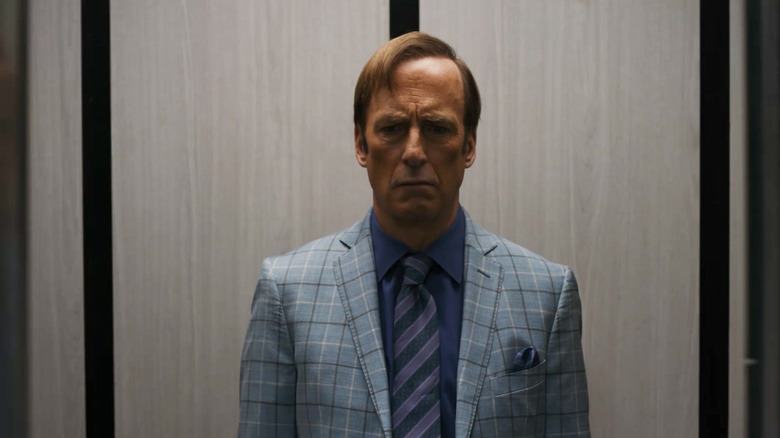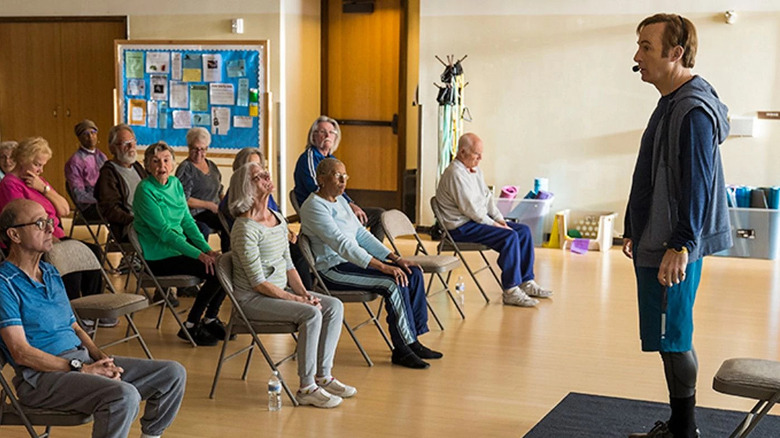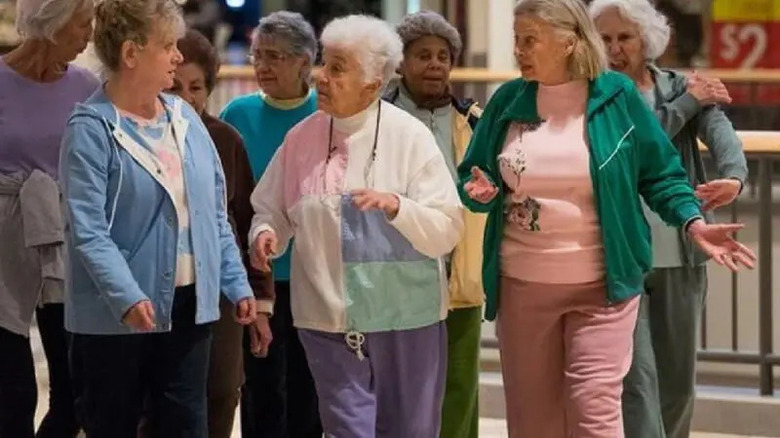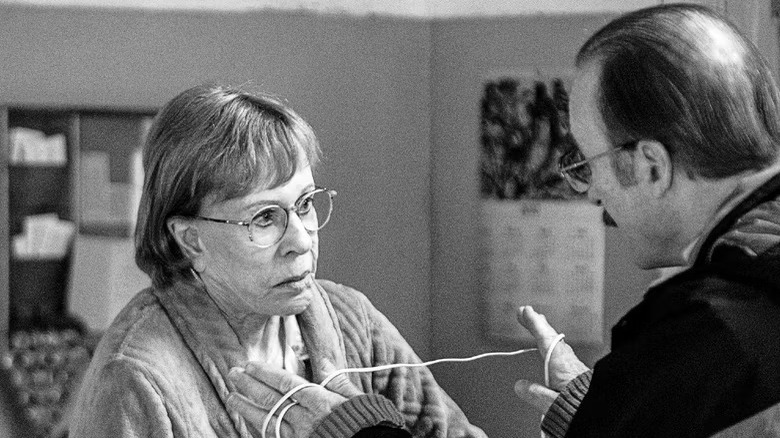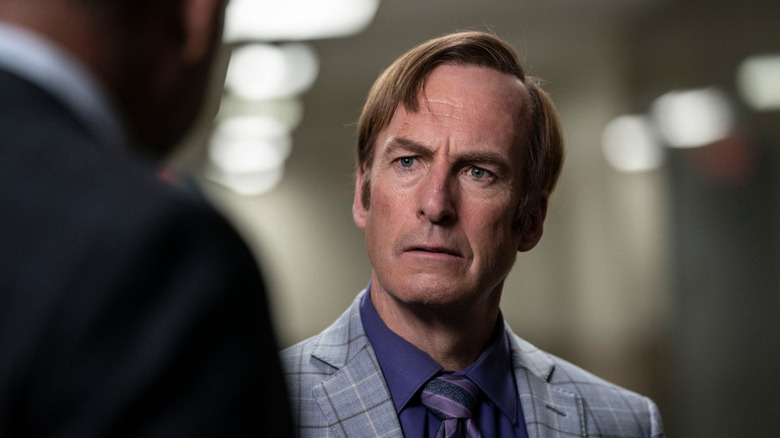In Better Call Saul, Jimmy's Greatest Strength Becomes Saul's Greatest Downfall
This post contains major spoilers for all of "Better Call Saul" thus far.
"Better Call Saul" is a truly miraculous series, a prequel to one of the best and most acclaimed shows of the century, centered around a seemingly two-dimensional supporting character. Yet the show pulled off one magic trick after another, and made us care about the characters, both returning and brand new. Better yet, it managed to sell the idea that we didn't really want to see Saul Goodman in the show (and you could argue we never did), because Jimmy McGill was simply too compelling and fun to watch.
As the show approached the end, however, the writers continued to up the ante with new and more shocking reveals, paying off several plot threads that were planted from the very start. One of these involved Jimmy McGill's first success story as a lawyer, once his superpower and his passion, ultimately becoming his downfall.
Fighting for the little guy
In the beginning, it was clear Jimmy got into law because he admired his brother Chuck, and because he thought his skills as a manipulator would be of use there. But it wasn't until Jimmy accidentally got involved with handling wills that he discovered he had a talent and a passion for dealing with older folks. Jimmy could charm anyone, but he had a special power over senior citizens, and he visibly started to enjoy building bonds with them even outside of work pleasantries.
Indeed, any time Jimmy bent the rules a bit in those early seasons, he did it to advance the case, and to genuinely help his clients. When Sandpiper made it harder to talk to its residents, Jimmy snuck around and bribed his way to reach them. Even if his immediate thoughts were on the settlement money, he was still helping people.
This stood in great contrast with the other lawyers on the show like Howard, Kim, and Chuck, who upheld the law as absolutely sacred and the judicial institutions as infallible. Kim, who started working in banking by helping a small local bank expand aggressively (like many banks did leading up to the 2008 crisis that ruined countless lives), disapproved of Jimmy's choices. Then there's Chuck, who despised everything Jimmy stood for. He believed in the law as something good, yet either failed to see or chose to ignore how the law can utterly fail to help people when they need it. The HHM law firm did things by the book, yes, but they also moved slowly, and they cared so little about the human element that Howard and Chuck often couldn't remember the names of their clients.
Slippin' Jimmy
Jimmy did some things wrong, but his justification was that he was tricking the system — which is already designed to make those less fortunate lose — to help the little guy. And it rubbed off on certain characters. Howard even started copying Jimmy's mannerisms when dealing with the senior citizens in the Sandpiper case, treating them like friends and showing interest.
Still, things started to get worse when Jimmy manipulated Irene Landry, the class representative in the Sandpiper lawsuit, to get her to settle early and get a big cash payment. His manipulations caused Irene to be ostracized from her group of friends, arguably one of the worse things Jimmy ever did. Again, he was still doing something good for his clients because if they kept waiting they might not live long enough to spend the money. Still, this was Jimmy taking full advantage of his superpower, to empathize with the elderly, and abusing it until it hurt someone he cared about.
But this is still Jimmy McGill, not Saul Goodman. When he realizes what happened, he is heartbroken and sickened by his actions, and manages to reverse it by placing the blame on himself and taking on the hate of the seniors who once loved him. This is the key to Jimmy McGill and "Better Call Saul": that every step of the way, you can see Jimmy was still able to do the right thing and wanted to do good. His "slip-ups" were more about wanting a quick shortcut than anything malicious.
Of course, that all changed when Kim left and Jimmy fully became Saul Goodman. The caring Jimmy was gone. Instead, he turned into a detached, cold, soulless man that wouldn't think twice about suggesting murder as an option, as we see in "Breaking Bad."
It's all good, man
"Better Call Saul" mostly skips Saul Goodman's part of the story (which we saw in "Breaking Bad" anyway), and jumps forward in time to catch Gene Takavic, his latest form, slipping into bad habits in the last couple of episodes of the show. After a phone call with Kim that doesn't go his way, Gene decides to return to his old ways and pull a series of big scams. The first step to accomplishing them? Befriending an old lady, played by Carol Burnett, no less! After conning his way into her home, Gene targets her son, who he manipulates into helping him.
This is bad enough already, but to truly show that the Jimmy we once knew is — to quote Obi-Wan – "truly dead," he stops the façade and the pleasantries with Burnett's Marion. He barely acknowledges her when he's at her house, going straight to her garage to meet up with her son. He ignores her in conversation, acts hostile towards her, and starts letting out information he shouldn't know, like details about the bond laws in New Mexico.
Jimmy McGill's final tragedy is that after years of showcasing an uncanny empathy for older folks and their well-being, he's undone when he uses those super-powers for purely selfish gains. He thinks he can control Marion, manipulate her, but this woman isn't one to fall under his sway. Even if she doesn't know who Saul Goodman is, she recognizes a con man, and in "Waterworks," she manages to identify him as a wanted criminal. Saul's confidence in Jimmy's abilities backfires spectacularly.
If there was ever any doubt that the man we knew as Jimmy is gone, it becomes clear when Gene grabs a phone cord and menacingly approaches Marion with dark intentions.
Look on my works, ye mighty
This essentially becomes this show's "Ozymandias," the "Better Call Saul" equivalent of Walter Jr. calling the cops on his father and protecting his mother and sister from the monster he once called dad after finding out about his drug empire. It was the moment everything Walt supposedly worked, schemed, lied, and killed for — his family — vanished before his very eyes. For Jimmy/Saul/Gene, this is the moment he betrays the very thing that once made him actually fall in love with the law.
Indeed, one thing the HeinsenVerse writers excel at is paying off small seeds from early in the shows and turning them into surprising thematic and emotional climaxes. Back when "Better Call Saul" first started and we saw Jimmy's slow descent into criminal law, who would have thought his downfall would come not from a double-crossed cartel associate or a random junkie, but from a sweet old lady?
